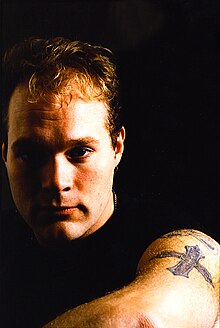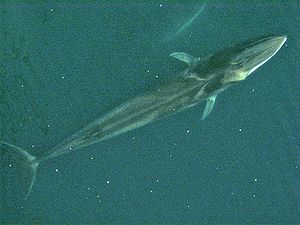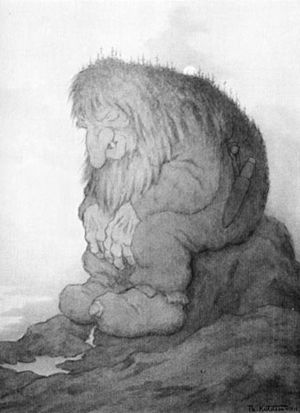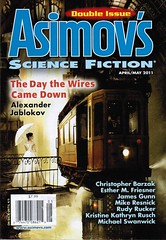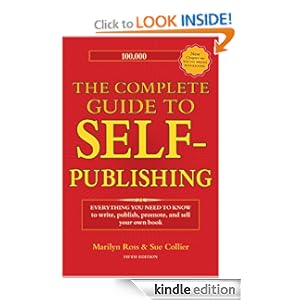 This book looks like a bit of a brick. I have to say that straight off. But, the tantalizing title has titillated me. Last week, while looking at my RSS feed to Ereaderiq, there was a brief spat of free books on writing and publishing. So naturally, I got them all. Being very interested in the field of self publishing, it looks like the kind of torture that might end up teaching me a thing or two about the industry and help me propel my own career into the foray. In essence, it seemed to me like a self inflicted Chinese water torture where every drip and drop represents a page, but it might lead to bigger and better things in my life. So, bring on the Chinese water.
This book looks like a bit of a brick. I have to say that straight off. But, the tantalizing title has titillated me. Last week, while looking at my RSS feed to Ereaderiq, there was a brief spat of free books on writing and publishing. So naturally, I got them all. Being very interested in the field of self publishing, it looks like the kind of torture that might end up teaching me a thing or two about the industry and help me propel my own career into the foray. In essence, it seemed to me like a self inflicted Chinese water torture where every drip and drop represents a page, but it might lead to bigger and better things in my life. So, bring on the Chinese water.Contrary to my initial impression, however, are 117 five star reviews, 23 four star reviews, and 12 with two and three stars. That suggests a lot of people have found this book extremely useful.
Now, to speak about myself briefly before going into the book itself, I am an amateur writer and a professional English teacher (ESL - in Korea). I believe I know my craft well. However, the few submissions I've made to a small list of publishers (Asimov's Science) has met with rejection. Ah, tis a part of the process, goes the lecture. Too often, great or at least successful writers find their works in the trash bin or otherwise rejected, only for the document to emerge from the bin like a phoenix from the ashes. Well, it's stories like those that inspire. But, there are also the untold stories of the ones that remain as ashes. There's the story of Captain Ahab where he obsesses, to his death, over the capture of Moby Dick, the great white whale. The moral of the story is that sometimes you can ruin yourself and those who are in your care. So, there are two sides of this coin: failure and harming your loved ones, and success, and bringing your loved ones along with you into the lap of luxury or at least comfort, not to mention living 'the dream.' Now, let's talk about the book itself...
So far, however, and we're talking 'introduction' here, I've been captivated by the topic. Maybe it really is a boring book and I'm just very interested in it. But maybe it's something else. In any case, the opening topic is self publishing history. I don't think they've gone all the way back, but they went back into American history several centuries back. It's actually a very interesting look into the quite long history of self publishing. She starts of with Ben Franklin, Mark Twain, Anais Nin, Edgar Allan Poe, and a number of other very famous authors. In other words, the author is saying that there are a lot of examples in the past of very successful authors capturing the imaginations and pennies of a very wide audience. The implication is that you can do it, too. People with good books to sell sell good books, and it doesn't matter so much the publishing house that sells them. Of course, a lot of those people went on to the publishing houses, so maybe that's just a good second step.
For me, a lot of it is about control. I want to control my work. I don't want people to reject it out of turn. I don't want it to tremble on a tall heap of maybes only to hit the recycling bin or the shredder. I like the idea of creating my own destiny. I love the idea of starting my own publishing house. This is just feeding me the idea that this is not only possible, but it's been done, and it'll be done again.
The Mine Field of POD and Vanity Presses
After basking in the glow of those who have self published in the past only to go on to huge success, the authors get into the mine field of POD and vanity presses. Some of the pitfalls include paying a lot of money for books that you wrote and spent money on to fine tune only to discover that you also signed away some of your rights to them, to having them actually turn down bulk sales that didn't meet their profit expectations.
To break it down simply: buyer beware.
Writing Your Book
I have to say that this part does not seem suitable for this book. I got this book to help me understand publishing, not how to write. There are many books about how to write books. I don't believe you can do both the publishing aspect and the writing aspect in the same book. While there is some very good advice, I don't think it's necessary. There is, however, a fair amount of talk about how, despite the difficulties arising from publishing some types of books, ie., poetry, there are those who have found success in many of them. There is also a part about how to name books and how to present them. I do see these as good portions of the book. But how to write the book? It just seems like meandering into a very different topic from publishing. Publishing is about putting your work out there, not about how to write it. Am I right?
There are also a lot of metaphors and similes that are used which don't really seem necessary or particularly entertaining. What's worse, is when she gets down into the details of how to choose words or what words not to choose, I feel like everything she's said is highly circumstantial. She writes, 'Have you ever seen anyone stand down?' Yet, that's the expression one hears from time to time in reference to an attack that's about to be made in a militaristic sense. She writes that one should not write 'early pioneers' and just 'pioneers.' But, some pioneers came to America in 1620. Some might have gone there in 1650. So, those in 1620 would be the 'early' pioneers.
She brings up the idea that one should inject simile and metaphor into writing. While that's true to an extent, it's contrary to her 'brevity is beautiful' statement just before it. Too often I cringe when I read forced simile and metaphor. Sometimes it's not necessary. Too much of it is annoying and poor taste. Another thing she brings up is the analogy. She mentions that one ought to use them. However, too often I find analogies used as a way to avoid trying to express something clearly. Often it does not really serve a useful purpose.
To be frank, the expose on writing fiction seemed pretty cliche in my opinion. It's the formula for tasteless fiction - I mean flavourless, not tasteless as in being bad erotica or sexist or something like that. I'm sure it works for a lot of the novels and other fiction out there, but this is precisely the kind of cliche literature building that I would want to avoid, albeit a lot of writers would probably agree with her. Chances are good, however, that those writers I'd seek to avoid. But, this is a matter of taste. I like to live on the fringe somewhere and not in the mainstream. So, my tastes in how to write will also be around the fringe, not in the mainstream.
Becoming a Publisher
I really like the idea of having my own publishing company. I really, really like that. I could go so far as to say that I would like nothing better than to start one with myself as the first author, and grow from there: graphic novels, comic books, novels, animations, movies. Really, the sky is the limit.
However, to get there, I'm not really willing to spend much more money. The amount of money I've already spent with no return at the present is enough for me. So, the next part where she talks about how to make companies, what you can do to raise capital (10-50k), is squeezing the rock for water. I want to pursue the inexpensive route: free (or very nearly free). There are enough options. She does bring up some of them, and she says beware, but that's the limit of the advice.
In fact, all the stuff she brings up in the chapter, "Establishing Your Publishing Company and Generating Capital" is kind of depressing. Sell your shirt, home, and soul to the devil (see bankers) on the chance that you might have a product worth buying and the ability to wear all the hats necessary to accomplish those goals. Of course, the 10-50k might very well be a part of that staff - but that is some very short-term cash for salaries. That little money might simply end up drying up by the time you've trained someone to do what it is that needs to be done to market the work. So, I think it unlikely that this monetary figure is going to include those kinds of salaries. However, when she writes about dipping into 401k, IRAs (?), Keogh Plans (?), etc., maybe that's the kind of money to make something like that work. Given a few hundred thousand dollars, maybe it would be possible to make some kind of functional company. But even then, the writer not only has to be a good writer, but also a good business manager. But, she doesn't stop there! She writes that if you have bad credit and don't have a golden parachute to melt down and take to the bank, why not go to the pawn shop? Surely you can find those few thousand dollars that way to make your dream come true. Is this lady for real? I'm waiting for the punch-line. I'm waiting... still waiting...
 Image via WikipediaMy own experience at trying to publish has proven to be very difficult. That is to say, just writing the darned tootin' thing was the easiest part. Getting quality artwork done for it was extremely difficult - that is to say, artwork which reflected what I had in mind when I wrote the thing. It cost me thousands of dollars, and by the time I was done with the first book, I had to go back to work again to fund the ongoing process. Each book that got done, I thought, "This is it! This is the book that'll make it for me." But then I keep running into those last hurdles: the graphic design and layout - which I have for one of them, but not quite complete, and the rest are still awaiting the hand of a graphic designer and layout person. Each of these jobs require a lot of skill and a better eye than what I have. So, what I thought would be a relatively easy exercise of writing a children's book and putting it together has become this huge obstacle course.
Image via WikipediaMy own experience at trying to publish has proven to be very difficult. That is to say, just writing the darned tootin' thing was the easiest part. Getting quality artwork done for it was extremely difficult - that is to say, artwork which reflected what I had in mind when I wrote the thing. It cost me thousands of dollars, and by the time I was done with the first book, I had to go back to work again to fund the ongoing process. Each book that got done, I thought, "This is it! This is the book that'll make it for me." But then I keep running into those last hurdles: the graphic design and layout - which I have for one of them, but not quite complete, and the rest are still awaiting the hand of a graphic designer and layout person. Each of these jobs require a lot of skill and a better eye than what I have. So, what I thought would be a relatively easy exercise of writing a children's book and putting it together has become this huge obstacle course.Now, in my current context, I cannot spend more money on those first four books which are all in disarray. So, these days I am working on a novel, and it's my goal to see that novel through to the end. Where once I thought the part of writing a good story was the hard part and that the rest could fall naturally into place without the aid of a professional publisher is long gone. I still think it's possible, just no where close to being easy. In fact, I have come to believe that I would have been better off going for the novel first, which takes a long, long time to write, and then moving onto graphically intense literature. That would have saved me an awful lot of expense.
Think about it: putting a novel together requires a front page graphic, back page, and the rest of it is about 90k words of writing, rewriting, etc. It's pretty much a one man show. But, nonetheless, I have four books behind me, in a variety of stages of completion. The hardest part for them (maybe aside from marketing them - an experience I don't yet have) is really behind me. Illustrating them was really hard. Laying them out is a little hard and a little expensive. So, I am optimistic.
Getting Technical - Dealing with Printing Presses
There are quite a few decisions to make before you print your book. You need to think about everything from paper size, to paper thickness, opacity, number of pages, each and every single one of them requires a significant amount of thought, and has repercussions.
The authors bring up so many details having to do with the actual printing of the books: binding, paper size, checking for your mistakes, checking for the printers' mistakes, making sure you get the correct number of pages for a whole number of signatures: where one signature = 16 or 32 pages. Thus, it's said, it will cost less to print 320 pages than it will to print 319. Then you have to worry about delivery, etc. etc. etc. All of this is a nightmare of choices and careful precautions that must be taken.
On top of all that, in this world, there are always those who are looking to take advantage of the new people who are looking to gain entry into the industry. Everything from people who suggest that a copyright should be given in the name of the printing press or owner of the printing press to ISBNs being assigned in their name. Essentially, doing either of these things means that you essentially lose ownership over the material. In fact, there is a recent case of this I remember reading about relating Rebecca Black, whose parents paid a lot of money to have a company do a music video for them. Later, when it became apparent that Rebecca was making money hand-over-fist, they brought out the contract which essentially said that they had paid to develop content for the company itself, not for themselves. These people are unscrupulous.
Marketing and Advertising
I really believe that this is where the book excels at. After the clumsy attempts at humour and extremely poor metaphors and other attempts at literary flourish in the early chapters comes a fairly clean, clear, and efficient writing model. Only rarely did I have to further suffer from further poor attempts. Furthermore, the sections on marketing and advertising are like a brainstorm on steroids. It's as if years of experience with trying out different strategies are blurted out in about 30-40k words. Only a very few of them are really pertinent to my situation. However, those few that I got out of this part were things I hadn't thought of before. That's really a big key.
There's a section on just about every current avenue to be used regarding marketing. While none of them are particularly well spelled out, I think it gives a good enough overview to give one an idea of where one can continue studying to flesh out the primer that is provided.
It also helped give me some courage. My book is really unique. As far as I know, there's nothing like it in the world and I believe there's a huge market for it in that niche (which is a hot topic these days). I can make products to both improve publicity and perhaps to even make a few dollars.
There are more pitfalls that this book warns about: everything from getting that first offer from a publisher, to expecting the publisher to do everything once they have your book. Also, some important things to watch out for in the contract and concessions to ask for.
Conclusion
I think the giveaway on Amazon was a real steal. This is a great book. It could be improved with a good index. It could have used a proofreader to take out the few loose screws here and there. But overall, I think this book offers the prospective publisher and writer a lot of business sense. It might even be worth $12.53.





